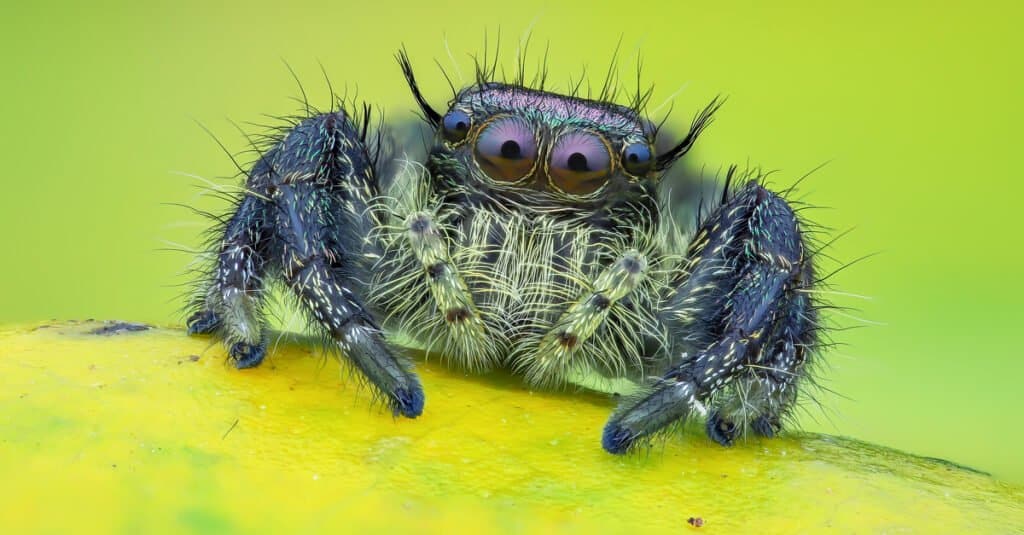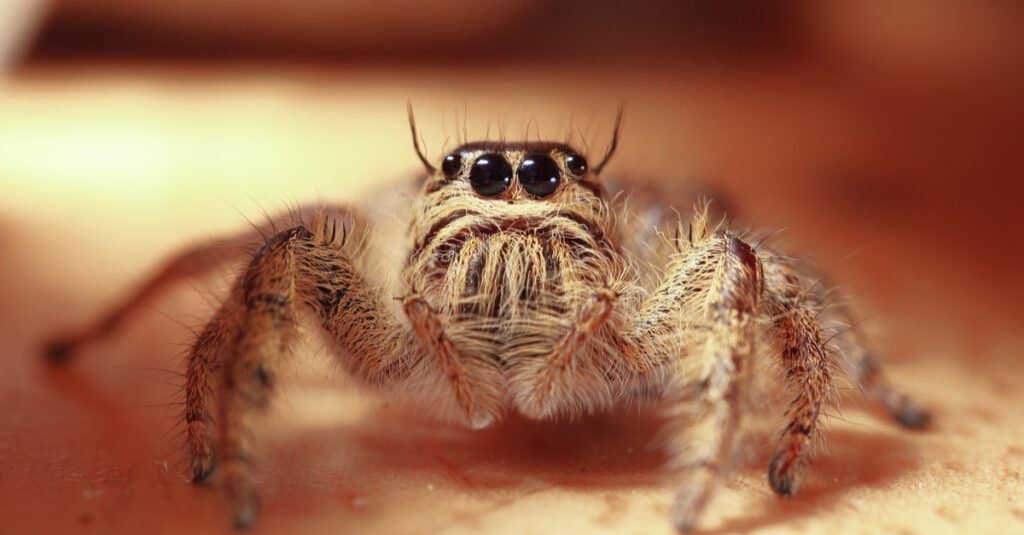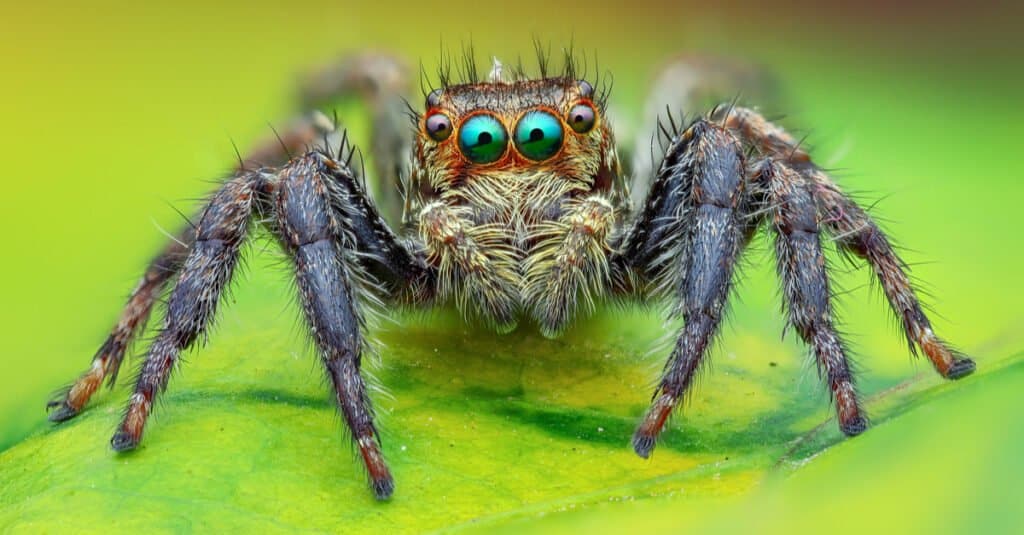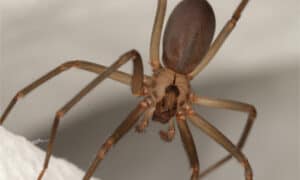Did you know that jumping spiders can leap as high as 50 times their body length? Most people get the creeps whenever they encounter jumping spiders because they fear getting jumped. However, there shouldn’t be any reason to fear jumping spiders. Jumping spiders are neither poisonous nor dangerous, and they are even great to have as pets! They may have fangs and possess venom glands, but these are barely a threat to humans. Although jumping spiders tend to bite when cornered or provoked, they are not poisonous at all, and they do not leave deep, excruciating bites on human skin. Jumping spiders are extremely smart, despite their tiny brains. Scientists have studied that these critters can learn and even create plans and strategies when hunting for their prey. Jumping spiders are easy to care for too, and they thrive in many habitat types and have a cute facade.
Do Jumping Spiders Bite?

Jumping spider bites are less severe than a bee sting.
©Tran The Ngoc/Shutterstock.com
Well, do they? Do jumping spiders bite? Like other spider species, jumping spiders have fangs and do bite. However, since their mouths are tiny and their jaws are not strong enough to leave deep wounds or severe complications, their bites are non-dangerous. Jumping spiders are non-aggressive spiders. They would instead run away than fight whenever threatened. However, when they feel cornered or provoked by humans, they can act in self-defense and bite. When jumping spiders are accidentally being crushed, like when you unintentionally sit on them on the couch, they can also bite in defense. Jumping spider bites are less severe than a bee sting and only leave a tiny welt no larger than a mosquito bite.
You will rarely see jumping spiders on their webs. Most jumping spiders prefer to hunt actively rather than waiting on their webs to capture anything. Jumping spiders spring their hind legs forward to capture prey. Instead of webs, you are most likely to see jumping spiders hanging by a strand of silk thread. Jumping spiders vary in color, size, and stripes or markings depending on the species. Some of them can have black or white stripes on their abdomens.
Is a jumping spider bite poisonous? Nonetheless, none of these jumping spider species are poisonous or dangerous to humans. While the jumping spider’s bite is typically harmless, they still contain venom. Some people are allergic to specific animal venoms, which trigger various allergic reactions.
Are Jumping Spiders Dangerous to Humans?

Though jumping spiders have venom, their bites are often harmless to humans.
©sippakorn/Shutterstock.com
Jumping spiders may contain venom, but this venom is not capable of causing any harm to humans. Jumping spiders have fangs that can bite and deliver their venom, but their bites are often harmless and shallow and can only leave small bumps like a mosquito bite. Therefore, a jumping spider bite is not dangerous to humans or even other animals.
Naturally, jumping spiders are non-aggressive. Apart from their usually passive and timid behavior, jumping spiders are not hostile around humans and can cohabitate with humans undisturbed. Jumping spiders do not attack on their own and rarely fight back when provoked. They often run when disturbed, but when cornered, they can turn to their last resort, which is biting. Since jumping spider bites are far from fatal, there is no need for concern. The jumping spider bite feels like typical insect bites and can never be more painful than a bee sting. It will only leave you with mosquito-like bites after biting.
However, people may be allergic to the jumping spider’s venom in some rare cases. A jumping spider’s venom injected into human skin is usually ineffective. Yet, for some allergic individuals, this venom can trigger some symptoms. These allergy symptoms should not be lethal but might need medical attention. Some allergic reactions to a jumping spider’s venom include:
- Dizziness
- Fever or chills
- Increased heart rate and blood pressure
- Swollen lymph glands
- Nausea and vomiting
- Rashes beyond the initial welt
- Red or purple blister
- Difficulty breathing
Developing allergic complications from a jumping spider’s bite is typically not fatal but needs prompt medical attention. If the symptoms do not go away within 24 to 48 hours, you need to call a doctor. Fortunately, there have been no records of serious injuries and death caused by jumping spiders.
Are Jumping Spiders Poisonous?

Because their venom is too weak to affect humans, jumping spiders are not poisonous.
©Tran The Ngoc/Shutterstock.com
Jumping spiders possess and deliver venom through their bites but are not poisonous. Their venom is too weak to affect humans or even larger pets. Jumping spiders’ venom is generally used for their prey. They inject their venom from their fangs directly into their victims’ bodies, paralyzing them. Jumping spiders eat various insects, such as moths, grasshoppers, crickets, bees, butterflies, mealworms, and other small invertebrates. However, since they don’t have the jaws strong enough to eat larger animals, they limit their food to smaller insects which are certain to be affected by their venom. The jumping spider venom can only affect these tiny critters and cannot poison larger animals, especially humans.
Jumping spiders won’t bite unless they feel they are in mortal danger. The best way to avoid getting bitten by a jumping spider is to refrain from disturbing or handling them. They can be suitable as pets, but utmost caution is required when it is your first time handling them.
How to Treat a Jumping Spider Bite
We’ve taken a look at the answers to the question, “do jumping spiders bite?”, and it’s only natural to discuss what to do in the event of being bitten by one of these arachnids.
Your first concern should be preventing any infection from getting into the injury. To this end, you will need to wash it with soap and water.
To stave off any redness or swelling you will need to apply a cold compress in the form of an ice pack or a damp towel to the spot. Doing so will also prevent the circulation of blood in the area. Some aspirin and acetaminophen will also prevent any pain.
If jumping spiders are not harmful, why would symptoms worsen after 24 – 48 hours? Because the offending arachnid may actually be a different species of spider, and not a jumping spider as you may have originally believed. On the other hand, you may actually be allergic to spider bites. In either case, you will need to seek medical advice at once, and even bring along the spider – where it is possible and safe for you to do so.
Are Jumping Spiders Poisonous to Dogs?
Jumping spiders are not aggressive. When approached, they will typically run away and not fight back. Since they are tiny, moving creatures, they can easily capture curious dogs’ attention. Dogs can sometimes poke, play with the jumping spider, or eat it. However, don’t worry about your dog getting into too much trouble when this happens. Jumping spiders can bite your dogs in self-defense, but their venom will not be enough to affect them. When eaten or ingested, jumping spiders cannot cause severe damage to dogs either. There isn’t much to worry about jumping spiders inside a dog’s mouth unless it has bitten the dog back. Yet, if the dog starts showing symptoms in the next few days, you might want to check in with a vet.
The photo featured at the top of this post is © sippakorn/Shutterstock.com
Thank you for reading! Have some feedback for us? Contact the AZ Animals editorial team.






